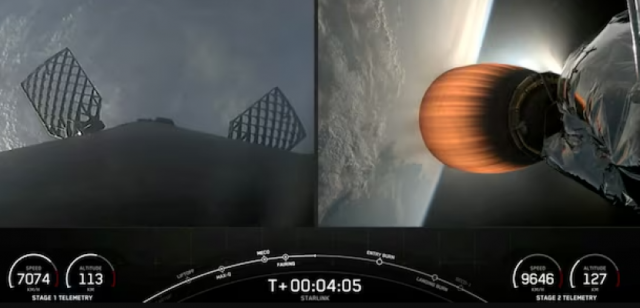SpaceX Falcon 9 glitch jeopardises starlink satellite mission
Rocket's second stage in space failed to reignite and deployed its 20 Starlink satellites into a much lower orbit

A second-stage engine on SpaceX's Falcon 9 rocket suffered a malfunction in space Thursday night that imperiled its payload of Starlink satellites, the first failure in more than 7 years of a rocket the global space industry relies on.
Roughly an hour after Falcon 9 lifted off from the Vandenberg Space Force Base in California on Thursday night, the rocket's second stage in space failed to reignite and deployed its 20 Starlink satellites into a much lower orbit than planned, where they risk burning up in Earth's atmosphere.
The attempt to reignite the engine in space "resulted in an engine RUD for reasons currently unknown," SpaceX CEO Elon Musk wrote on his social media platform X, referring to an industry acronym for Rapid Unscheduled Disassembly that usually means explosion.
The botched mission of the world's most active rocket breaks a coveted success streak that has maintained SpaceX's dominance of the industry. Many countries and space companies rely on the privately-owned company, valued at roughly $200 billion, to send their satellites and astronauts into space.
Musk said SpaceX was updating the Starlink satellites' software to force their on-board thrusters to fire harder than usual to avoid a fiery atmospheric re-entry.
"Unlike a Star Trek episode, this will probably not work, but it’s worth a shot," he said.
The failed engine firing occurred on Falcon 9's 354th mission and was the first Falcon 9 failure since 2016, when a rocket exploded on a launch pad in Florida and destroyed its customer payload, an Israeli communications satellite.
"We knew this incredible run had to come to an end at some point, but 344 flights in a row is amazing!," Tom Mueller, SpaceX's former vice president of propulsion who designed Falcon 9's engines, replied to Musk on X. "The team will fix the problem and start the cycle again."
Although the Falcon 9 flight was an in-house mission, the rocket's failure and SpaceX's investigation into its cause could impact the schedule for the company's upcoming customer missions.
Falcon 9, which launches SpaceX's Crew Dragon astronaut taxi, is the only US rocket capable of sending NASA crews to the International Space Station.
Read: SpaceX launches 20 Starlink internet satellites into orbit
NASA did not immediately return a request for comment. The US space agency has been trying to help fix unrelated problems with Boeing's Starliner, which is in the midst of a high-stakes test mission to prove it can become NASA's second astronaut ride to orbit alongside Crew Dragon.
SpaceX has launched some 7,000 Starlink satellites of various designs into space since 2018 for its global broadband internet network, as the individual satellites' production costs have changed several times.
Industry analysts say satellites on Thursday's mission could be worth at least $10 million combined.



















COMMENTS
Comments are moderated and generally will be posted if they are on-topic and not abusive.
For more information, please see our Comments FAQ